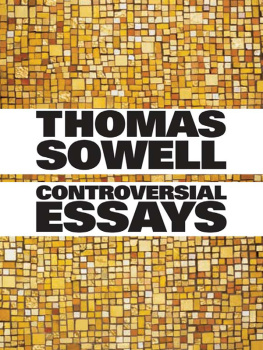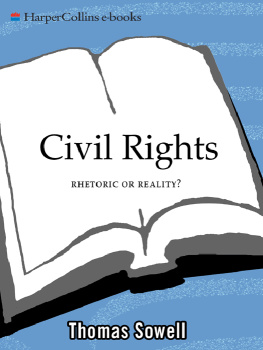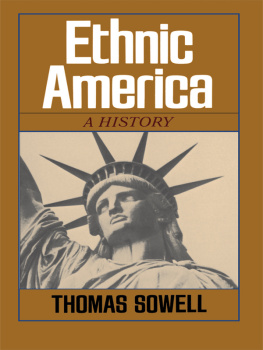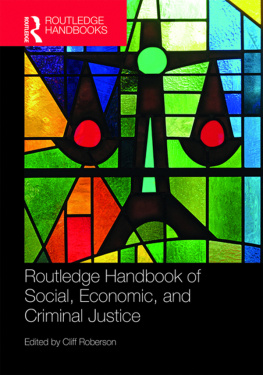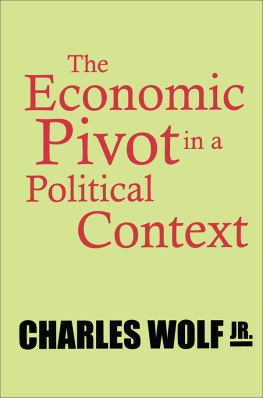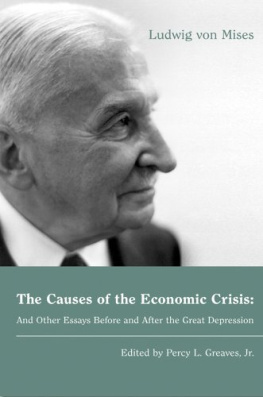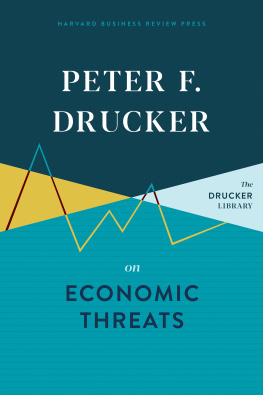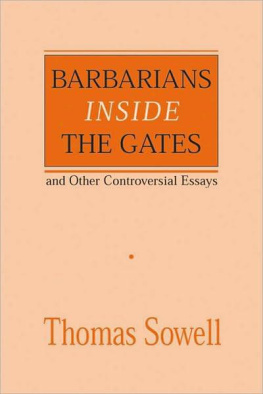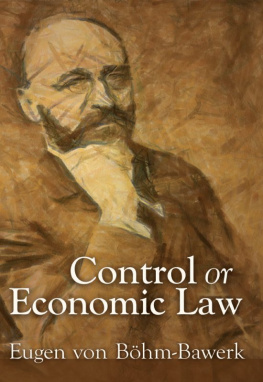Sowell - Controversial Essays
Here you can read online Sowell - Controversial Essays full text of the book (entire story) in english for free. Download pdf and epub, get meaning, cover and reviews about this ebook. City: Stanford;CA;United States, year: 2002, publisher: Hoover Institution Press, genre: Politics. Description of the work, (preface) as well as reviews are available. Best literature library LitArk.com created for fans of good reading and offers a wide selection of genres:
Romance novel
Science fiction
Adventure
Detective
Science
History
Home and family
Prose
Art
Politics
Computer
Non-fiction
Religion
Business
Children
Humor
Choose a favorite category and find really read worthwhile books. Enjoy immersion in the world of imagination, feel the emotions of the characters or learn something new for yourself, make an fascinating discovery.
Controversial Essays: summary, description and annotation
We offer to read an annotation, description, summary or preface (depends on what the author of the book "Controversial Essays" wrote himself). If you haven't found the necessary information about the book — write in the comments, we will try to find it.
One of conservatisms most articulate voices dissects todays most important economic, racial, political, education, legal, and social issues, sharing his entertaining and thought-provoking insights on a wide range of contentious subjects. This book contains an abundance of wisdom on a large number of economic issues. Mises Review
Sowell: author's other books
Who wrote Controversial Essays? Find out the surname, the name of the author of the book and a list of all author's works by series.
Controversial Essays — read online for free the complete book (whole text) full work
Below is the text of the book, divided by pages. System saving the place of the last page read, allows you to conveniently read the book "Controversial Essays" online for free, without having to search again every time where you left off. Put a bookmark, and you can go to the page where you finished reading at any time.
Font size:
Interval:
Bookmark:

The Hoover Institution on War, Revolution and Peace, founded at Stanford University in 1919 by Herbert Hoover, who went on to become the thirty-first president of the United States, is an interdisciplinary research center for advanced study on domestic and international affairs. The views expressed in its publications are entirely those of the authors and do not necessarily reflect the views of the staff, officers, or Board of Overseers of the Hoover Institution.
www.hoover.org
Hoover Institution Press Publication No. 511
Copyright 2002 by Thomas Sowell
All rights reserved. No part of this publication may be reproduced, stored in a retrieval system, or transmitted in any form or by any means, electronic, mechanical, photocopying, recording, or otherwise, without written permission of the publisher.
First printing 2002
07 06 05 04 03 02 9 8 7 6 5 4 3 2 1
Manufactured in the United States of America
The paper used in this publication meets the minimum requirements of the American National Standard for Information SciencesPermanence of Paper for Printed Library Materials, ANSI Z39.481984. 
Library of Congress Cataloging-in-Publication Data
(CIP data for this publication is available from the Library of Congress.)
ISBN 0-8179-2992-4
The Hoover Institution on War, Revolution and Peace, founded at Stanford University in 1919 by Herbert Hoover, who went on to become the thirty-first president of the United States, is an interdisciplinary research center for advanced study on domestic and international affairs. The views expressed in its publications are entirely those of the authors and do not necessarily reflect the views of the staff, officers, or Board of Overseers of the Hoover Institution.
www.hoover.org
Hoover Institution Press Publication No. 511
Copyright 2002 by Thomas Sowell
All rights reserved. No part of this publication may be reproduced, stored in a retrieval system, or transmitted in any form or by any means, electronic, mechanical, photocopying, recording, or otherwise, without written permission of the publisher.
First printing 2002
07 06 05 04 03 02 9 8 7 6 5 4 3 2 1
Manufactured in the United States of America
The paper used in this publication meets the minimum requirements of the American National Standard for Information SciencesPermanence of Paper for Printed Library Materials, ANSI Z39.481984. 
Library of Congress Cataloging-in-Publication Data
ISBN 0-8179-2992-4
ISBN-13: 978-0-8179-2993-0 (electronic)
These essays first appeared in my nationally syndicated newspaper column, and the favorable responses they received from readers have led to their being reprinted here. Many of the events which provoked these writings raised questions that went beyond the passing episodes involved. This was especially so where economic issues were involved, for these same fundamental issues recur in the economy over the yearsand centuriesin various guises. Similarly, racial issues in the United States today involve many of the same principles that have been controversial in relations between various racial and ethnic groups in other countries and in other times.
In addition to the very serious issues raised in many of these essays, there are also some lighter subjects and even the serious issues sometimes have their lighter aspects. Without a sense of humor, politics would be too painful to bear.
Special thanks must go to the Hoover Institution and to Stanford University, whose rich research sources made informed commentary on a wide variety of subjects possible, and to my assistant Na Liu, whose diligent work unearthed the information that I needed. Finally, acknowledgement is also due to Karen Duryea of Creators Syndicate, who caught errors in spelling, grammar, syntax, and facts that might otherwisehave slipped in these columns, to my chagrin. The same thanks must go to a conscientious copy-editor at the Hoover Institution Press who caught some more lapses of mine.
Thomas Sowell
A tourist in New York's Greenwich Village had his portrait sketched by a sidewalk artist, who charged him $100.
That's expensive, the tourist said. But it's a great sketch, so I'll pay it. But, really, it took you only five minutes.
Twenty years and five minutes, the artist replied.
The same misconception of costs runs through the much more serious issue of the prices of medicine and government regulation of those prices. When a pill whose ingredients cost a quarter is sold for two dollars, that is an open invitation to demagogues to begin loudly denouncing the pharmaceutical drug company's obscene and unconscionable profits at the expense of the sick. But the people who are doing this are counting only the five minutes and ignoring the twenty years.
The physical ingredients of the medicine are its cheapest ingredients. The ingredient that costs millions of dollarssometimes hundreds of millionsis the knowledge gained from years of research, and trial and error, which finally results in the creation of a new medicine. That is what the price of the pills has to cover, if we expect investors to continue to pour vast sums of money into drug companies that are trying to discover new cures for such diseases as cancer, AIDS and Alzheimer's.
Other companies, manufacturing generic equivalents, payonly the costs of the physical ingredients, having copied the enormously expensive formula free of chargelegitimately after the patent has expired and not so legitimately in other countries, where patent laws are not taken as seriously as in the United States. The company that simply uses someone else's formula free of charge can sell the same pill for 35 cents and still make a profit.
Somebody has to pay the high costs of discovery or the development of new drugs will be slower and therefore more people will needlessly suffer and die. While allowing patent laws to be over-ridden by politicians allows some people to buy the drug at low prices, based on the low current costs of manufacturing the medicine, that just leaves the far greater overhead costs of creating these medicines to be paid by others.
Worst of all, it leaves the even higher costs of needless pain, suffering and premature death to be paid by those whose relief is delayed for years by policies like these, which slow down the development of new medicines to cure their afflictions.
The United States has been one of the few countries resisting political pressures to impose price controls on pharmaceutical drugs, or to water down the patent laws which allow the original discoverer of new drugs to have a monopoly for a fixed number of years, so as to recover the costs of discovery before other companies get to use their formula free of charge.
The United States also produces a wholly disproportionate share of all the new life-saving drugs in the world. But politicians ignore this connection. Other countries have scientists capable of developing new medicines, but the economics and politics of the situation discourage companies in those countries from making the huge investments made by American pharmaceutical companies under American patent law.
Unfortunately, the Bush administration has recently begun to cave in to the demagogues at home and abroad. After Congressional liberals like Ted Kennedy, Henry Waxman, and Charles Schumer began making noises about a need to get the drug Cipro cheaper because of the anthrax scare, the administration threatened to over-ride the patent for the drug unless the manufacturer supplied it at a cheaper rate.
Font size:
Interval:
Bookmark:
Similar books «Controversial Essays»
Look at similar books to Controversial Essays. We have selected literature similar in name and meaning in the hope of providing readers with more options to find new, interesting, not yet read works.
Discussion, reviews of the book Controversial Essays and just readers' own opinions. Leave your comments, write what you think about the work, its meaning or the main characters. Specify what exactly you liked and what you didn't like, and why you think so.

